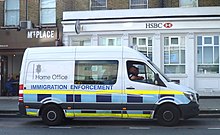
A | B | C | D | E | F | G | H | CH | I | J | K | L | M | N | O | P | Q | R | S | T | U | V | W | X | Y | Z | 0 | 1 | 2 | 3 | 4 | 5 | 6 | 7 | 8 | 9
 | |
 2 Marsham Street, Westminster | |
| Department overview | |
|---|---|
| Formed | 27 March 1782 |
| Preceding Department | |
| Jurisdiction | Government of the United Kingdom |
| Headquarters | 2 Marsham Street, London, SW1P 4DF |
| Annual budget | £20.3 billion (2022-2023)[1] |
| Secretary of State responsible |
|
| Ministers of State (attending Cabinet) responsible |
|
| Department executive |
|
| Website | www |

The Home Office (HO), also known (especially in official papers and when referred to in Parliament) as the Home Department,[2] is a ministerial department of the Government of the United Kingdom. It is responsible for immigration, security, and law and order. As such, it is responsible for policing in England and Wales, fire and rescue services in England, Border Force, visas and immigration, and the Security Service (MI5). It is also in charge of government policy on security-related issues such as drugs, counterterrorism, and immigration. It was formerly responsible for His Majesty's Prison Service and the National Probation Service, but these have been transferred to the Ministry of Justice.
The Cabinet minister responsible for the department is the Home Secretary,[3] a post considered one of the Great Offices of State; it has been held by James Cleverly since November 2023. The Home Office is managed from day to day by a civil servant, the Permanent Under-Secretary of State of the Home Office.
The expenditure, administration, and policy of the Home Office are scrutinised by the Home Affairs Select Committee.[4]
Organisation
The Home Office is headed by the Home Secretary, a Cabinet minister supported by the department's senior civil servant, the permanent secretary.
Organisational structure
The Home Office comprises eleven directorates that help fulfil the department's responsibilities.[5]
Immigration
- Border Force – controls migration at ports and airports across the UK and overseas.
- HM Passport Office – provides passport and civil registration services in England and Wales.
- Immigration Enforcement – responsible for enforcing immigration law in the UK.
- UK Visas and Immigration – processes visa, asylum, and citizenship applications.
- Migration and Borders Group – responsible for immigration policymaking.
Public services and policing
- Public Safety Group – responsible for policy areas including fire, policing, and crime reduction. Also responsible for implementing the Emergency Services Network.
- Homeland Security Group – develops policy and works with law enforcement and intelligence services to reduce risk from Terrorism, state threats, and organised crime to the UK.
Other
- Corporate and Delivery – fulfils corporate duties such as human resources, project management, finance, and IT.
- Communications Directorate – delivers communications to the wider public to achieve the Home Office's objectives.
- STARS (Science, Technology, Analysis, Research, and Strategy) – performs data and evidence analysis to maximise organisational effectiveness.
As of April 2024, the Home Office works with the following agencies and public bodies:[6]
Executive non-departmental public bodies
- Disclosure and Barring Service (DBS)
- Gangmasters and Labour Abuse Authority
- Independent Office for Police Conduct (IOPC)
- Office of the Immigration Services Commissioner
- Security Industry Authority (SIA)
Advisory non-departmental public bodies
- Advisory Council on the Misuse of Drugs
- Animals in Science Committee
- Biometrics and Forensic Ethics Group
- Migration Advisory Committee
- Police Advisory Board for England and Wales
- Police Remuneration Review Body
- Technical Advisory Board
Tribunals
Independent monitoring bodies
- Biometrics and Surveillance Camera Commissioner
- Independent Anti-Slavery Commissioner
- Independent Chief Inspector of Borders and Immigration
Others
- Adjudicator's Office
- College of Policing
- Commission for Countering Extremism
- Forensic Science Regulator
- His Majesty's Inspectorate of Constabulary and Fire & Rescue Services
- Independent Family Returns Panel
- Independent Reviewer of Terrorism Legislation
- Investigatory Powers Commissioner's Office
- National Counter Terrorism Security Office
- National Crime Agency Renumeration Review Body
- Security Service (MI5)
Budget and spending
In the financial year 2022-2023, the Home Office had a total budget of £20.3 billion.[7]
| Directorate | 2022-2023 | |
|---|---|---|
| Resource (£millions) |
Capital (£millions) | |
| Delivery | 77.8 | 3.0 |
| STARS | 34.6 | 43.0 |
| Homeland Security Group | 1,125.1 | 157.8 |
| Public Safety Group | 11,204.4 | 225.4 |
| Migration & Borders | 228.0 | 172.2 |
| Customer Service (UKVI & HMPO) | -3,166.3 | 87.4 |
| Asylum & Protection | 4,498.8 | 6.9 |
| Borders & Enforcement | 1,404.8 | 135.4 |
| Corporate Enablers | 945.6 | 37.9 |
| Digital Data & Technology | 473.0 | 40.0 |
| Legal | 11.1 | - |
| Communications | 8.6 | - |
| Arms Length Bodies | 99.9 | 16.4 |
| Total | 17,005.3 | 925.4 |
Home Office ministers
The Home Office ministers are as follows, with cabinet ministers in bold:[8]
| Minister | Portrait | Office | Portfolio |
|---|---|---|---|
| The Rt Hon. James Cleverly TD VR MP | 
|
Secretary of State for the Home Department | Overall responsibility for all Home Office business, including:; overarching responsibility for the departmental portfolio and oversight of the ministerial team; cabinet; National Security Council (NSC); public appointments; oversight of the Security Service; overall responsibility for the Home Office response to COVID-19 including health measures at the border and police powers to enforce lockdown.[9] |
| The Rt Hon. Tom Tugendhat MBE VR MP | 
|
Minister of State for Security | Counter terrorism – Prepare, Prevent, Pursue, Protect; response to state threats; cyber security and crime; serious and organised crime; oversight of NCA; aviation and maritime security; economic security; economic crime (including anti-corruption and illicit finance); international criminality; fraud; countering extremism; extradition policy and operations; Special Cases Unit (exclusions, deprivations etc.); MP security and VIP protection; online safety; victims of terrorism.[10] |
| The Rt Hon. Michael Tomlinson KC MP | 
|
Minister of State for Countering Illegal Immigration | Safety of Rwanda Bill; Illegal Migration Act implementation; Nationality and Borders Act implementation; small boats policy; asylum and modern slavery policy; upstream and organised immigration crime; returns and removals; Migration and Economic Development Partnership; third country agreements and third country asylum processing; foreign national offender removal; detention estate; Immigration Enforcement; compliant environment.[11] |
| Tom Pursglove MP | 
|
Minister of State for Legal Migration and the Border | Net migration; UK points-based system; simplifying the immigration system and immigration rules; current and future visa policy; nationality; Windrush; Home Office interests in free trade; Future Borders and Immigration System and Border Strategy 2025; agreements; UK Visas and Immigration, HM Passport Office and EU Settlement Scheme; asylum decision making (backlog); accommodation (closing hotels); Border Force operations;
Safe and legal routes and resettlement, including: Ukraine Family Scheme, Homes for Ukraine Scheme, Afghan Citizens Resettlement Scheme, Afghan Relocation and Assistance Policy, Hong Kong British Nationals (Overseas), Gaza and Israel.[12] |
| The Rt Hon. Chris Philp MP | 
|
Minister of State for Crime, Policing and Fire | Policing; police accountability and efficiency; local policing response to organised crime; public order, major events and Public Order Bill; cutting crime; criminal justice system; drugs and county lines; unauthorised encampments; firearms; alcohol and licensing; anti-social behaviour; neighbourhood crime; policing elements of RASSO (and any wider policing elements of the safeguarding portfolio); civil contingencies; ESMCP; Police, Crime, Sentencing and the Courts Act; fire policy; Home Office elements of fire operations; Grenfell. |
| Laura Farris MP | 
|
Parliamentary Under-Secretary of State for Victims and Safeguarding | Tackling violence against women and girls; domestic abuse; FGM and forced marriage; child sexual abuse and exploitation; Disclosure and Barring Service; Gangmasters and Labour Abuse Authority; sexual violence; Rape Review; prostitution; stalking; hate crime; crime prevention; early youth intervention; victim support; victims elements of RASSO; spiking. Held jointly with the Ministry of Justice |
| The Rt Hon. The Lord Sharpe of Epsom OBE | 
|
Parliamentary Under-Secretary of State for the Home Department | Home Office responsibilities: public safety and national security 'shadow' in the Lords; public safety and national security legislation. Cross-cutting: departmental reform and Transformation Programme; commercial; digital and technology; data and identity; analysis, science and research; programme portfolio; public appointments and sponsorship; inquiries; Better Regulation. |
| This article is part of a series on |
| Politics of the United Kingdom |
|---|
 |
